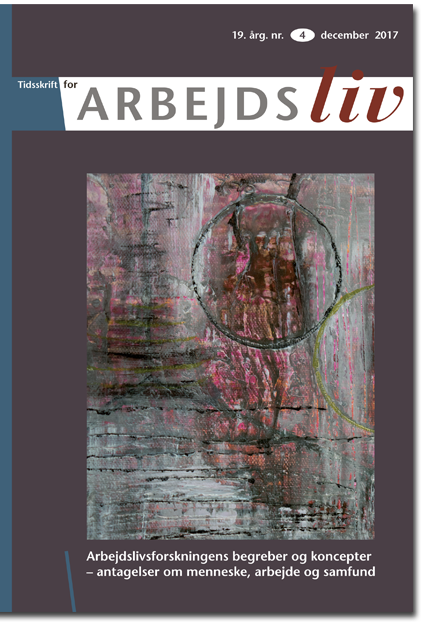Return of the Authority as Empowerment? Work and Subjectivity in Transformation
A Materialistic View on the ‘New Spirit of Capitalism’
DOI:
https://doi.org/10.7146/tfa.v19i4.109050Abstract
This article suggests a materialistic interpretation of new pivotal trends in work in western late capitalistic countries with a specific view to the implications for ‘subjectivity at work’. To begin with, early phases of ‘the spirit of capitalism’ are described - with emphasis placed on Fordism and its social divisions and contradictions, including workers’ orientations. From an empirical study of Tayloristic work, specific forms of authority and workers’ defense are pointed out. The defense mechanisms in question are not interpreted as a general ‘resistance to change’; rather as a manifesta - tion of conflicts of interest, containing political resistance as well as discipline. Following this; pivotal trends in the globalization of neo-liberal late capitalism - from the eighties and later on - are described, including the implications for companies’ ‘post-fordist’ organizational structure and working conditions. The new conditions impact on the traditional de - mands including the relationships between employer and employees, management and workers, but they do not simply eliminate or supersede them. They rather overlay and restructure them; thereby adding new char - acteristics to conflicts and contradictions. Finally, an empirical study of a post-ford - ist organization in flux is presented. Here, resistance is ‘overcome’ – i.e. defeated - as employees seemingly give up their former orientations and experiences in order to comply with endless demands of ‘development’. In a mixture of compulsion and motivation, a specific subjective dynamic ap - pears – characterized by a ‘flight forward’. The study hereby demonstrates ‘empowerment’ – not in the sense of liberation and self fulfilment, but in the sense of a ‘broken autonomy’. Learning hereby playing the role as a new version of discipline. On this basis, seven basic theses are suggested in regards to new contradictory conditions which management and employees have to come to terms with, given the neo- liberalistic forms of organization and work. The article rounds off, further presenting theses on the consequences for new subjectivity, discipline, and stress – and (potential) forms of solidarity and resistance to work.
Downloads
Published
How to Cite
Issue
Section
License
Forfattere, der publicerer deres værker via dette tidsskrift, accepterer følgende vilkår:
- Forfattere bevarer deres ophavsret og giver tidsskriftet ret til første publicering, samtidigt med at værket ét år efter publiceringen er omfattet af en Creative Commons Attribution-licens, der giver andre ret til at dele værket med en anerkendelse af værkets forfatter og første publicering i nærværende tidsskrift.
- Forfattere kan indgå flere separate kontraktlige aftaler om ikke-eksklusiv distribution af tidsskriftets publicerede version af værket (f.eks. sende det til et institutionslager eller udgive det i en bog), med en anerkendelse af værkets første publicering i nærværende tidsskrift.
- Forfattere har ret til og opfordres til at publicere deres værker online (f.eks. i institutionslagre eller på deres websted) forud for og under manuskriptprocessen, da dette kan føre til produktive udvekslinger, samt tidligere og større citater fra publicerede værker (se The Effect of Open Access).





